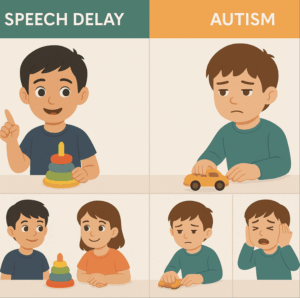Speech Delay vs Autism: How to Tell the Difference
 🔍 Introduction
🔍 Introduction
One of the most common concerns parents bring to a psychiatrist or pediatrician is:
“My child is not speaking yet. Is it just a delay, or could it be autism?”
It’s a valid question. Many children have late speech—but when is it a harmless delay, and when is it part of a broader developmental issue like Autism Spectrum Disorder (ASD)?
This article helps you understand the difference between speech delay and autism, and when to seek help.
🧠 What Is Speech Delay?
Speech delay means a child doesn’t meet expected speech milestones for their age. However, the social intent and interaction remain intact.
Features of isolated speech delay:
-
Child tries to communicate through gestures and expressions
-
Understands instructions (“Give me the ball,” “Sit down”)
-
Shows interest in people and play
-
Uses eye contact and joint attention (looks at what you’re pointing to)
-
Shows frustration at not being understood, but wants to interact
🟢 This child may benefit mainly from speech therapy.
🧩 What Is Autism?
Autism is a neurodevelopmental condition affecting communication, social interaction, and behavior. Delayed or unusual speech is only one part of the picture.
Features suggestive of autism:
-
Lack of social intent in communication
-
Poor eye contact, does not respond to name
-
Does not use gestures meaningfully (like pointing or waving)
-
Limited or no interest in peers
-
Repetitive behaviors (lining up toys, flapping, spinning)
-
Fixated interests and sensory sensitivities
-
May use echoing speech (echolalia) or scripted phrases
🟠 These children need a multidisciplinary approach: speech therapy, occupational therapy, parent training, and often psychiatric input.
🔄 Speech Delay vs Autism: A Quick Comparison
| Feature | Speech Delay | Autism |
|---|---|---|
| Eye contact | Normal | Often reduced |
| Gestures | Points, waves, nods | Limited or absent |
| Social interest | Enjoys games, people | Prefers objects, aloof |
| Understanding | Understands age-level instructions | May struggle with even simple directions |
| Play behavior | Pretend play develops | Repetitive, rigid play |
| Reactions to sound | Typical | May be over- or under-sensitive |
| Use of speech | Wants to talk but can’t | Often doesn’t see the point in talking |
🧪 Diagnostic Tools
-
M-CHAT-R – Screening for autism in toddlers
-
CARS-2 / INCLEN-ASD – Clinical rating scales
-
Speech-Language Evaluation – To assess expressive and receptive language
-
Developmental Assessments – By psychiatrists, psychologists, or developmental pediatricians
💬 Real-Life Example
Vedika, age 3, wasn’t talking. But she followed instructions, pointed to animals in books, and brought toys to her mother to show. A speech delay was diagnosed, and she began speech therapy. Within 6 months, she was speaking in short phrases.
Ritvik, also 3, didn’t respond to his name, avoided eye contact, and spun wheels for hours. He had echolalia and didn’t play with other children. He was diagnosed with autism and started a structured therapy program with multiple professionals.
🎯 When to See a Specialist
📌 If your 18-month-old is not pointing, waving, or showing joint attention
📌 If your 2-year-old is not saying single words
📌 If your 3-year-old is not using 2-word phrases meaningfully
📌 If your child doesn’t respond to name, avoid eye contact, or prefers being alone
📍 Dr. Srinivas Rajkumar T
Consultant Psychiatrist – Child, Adolescent & Geriatric Psychiatry
Apollo Clinics Velachery & Tambaram | Mind & Memory Lab
🌐 www.srinivasaiims.com | 📞 +91 85951 55808
Offering developmental screening, differential diagnosis, and early intervention plans.